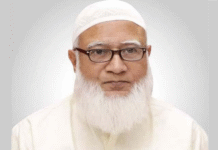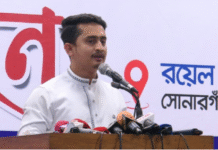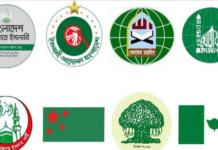For past several months the government agency that has featured most in media reports in Bangladesh, probably much more than its share of the national budget, is the Police.It may be justifiably so because Police is the first and most visible symbol of government in any country, let alone the sub continent. Everyone recognizes a member of this force at first encounter, both good and bad. Good are not usually scared by Police although not exactly overjoyed when visited by Police; and the bad of course tries to shy away from Police presence, if not flee altogether.But events seem to be changing dramatically in Bangladesh as both good and bad are getting equally chary of Police.
In fact a serving public official, who is in charge of Police, has recently advised that journalists would do well to avoid the Police while doing their work. Move out of the way of Police perhaps that is what he meant. Is the situation in the country that awful?
Police in a country is the ultimate and sometimes the only symbol of law enforcement; a force that people count upon to protect life and property, ensure safety of neighborhood, and seek and arraign law breakers and criminals. Very presence of Police is supposed to bring assurance of peace and order in a community. Police is regulated in different countries in different ways. In most developed countries, including the USA, the Police is regulated by local administration, which in most cases is run by elected officials. The Police Force is accountable for its activities and conduct to the elected local head. In large metropolitan areas the Police Force may be autonomous, but it is accountable to the local legislature/corporation for its conduct.
In our sub-continent, however, we inherited a system that is still largely grounded on an act that was adopted hundred and fifty years ago (Police Act of 1861). The system depends on a centralized government force at provincial or state level in India and Pakistan, and at national level in Bangladesh. The Police Act, 1861 was enacted by the British in the aftermath of the Mutiny of 1857 or the First War of Independence. The British, naturally at that time wanted to establish a police force that would suit the purpose of crushing dissent and any movement for self government.
Despite the colonial heritage we have worked with this Act for all of these hundred and fifty plus years in the sub continent (with some tweaking of words here and there), because the Act provided a solid framework for regulating and guiding the Police, which forms the bulwark of law enforcement. The Act is a virtual compendium on the constitution of the police force, hierarchy, organization, and police-magistracy relation as well as police-public relation. There has been call from time to time in India particularly to amend the Act to make it more suited to changes in time, and make Police more responsive to public needs. However, there has been no serious attempt either to replace or make major changes in the Act at political level, as the Act seemed to have worked reasonably well so far.
Recent happenings with the Police Force in our country, and for that matter, the trend obtaining in the country in our Law enforcement agencies for quite some time, has little to do with the Police Act itself. The Act defines how the force is constituted, how it will be managed, recruitment, dismissal from the force, etc. It does not define, however, how to insulate the Police from political pressure, how to immunize it from politicization, or how to make it more accountable and responsible to the public which it is supposed to serve and protect. The Act talks about recruitment to the force and dismissal from the force. But it does not specifically address how to immunize the recruitment and dismissal from political influence.
Since its creation in the British period the Police Force has been perceived to be more a Government agent than a public servant. However, that perception apart, the image of the average Police Officer in a rural setting has rarely been the one of an oppressor. The Thana or the Police Station was seen as a bastion of safety and recourse for seeking protection from crimes. In my days as a Sub-Divisional Officer (Magistrate) I would see half the cases that came for trial were initiated by the Police on complaints from the public. There were few bad eggs among the Police at any time, but more in the force were known for their dedication to work and duty than for harassing the public. In 1971 we also had seen the heroism of this Force in resisting the Pakistan Army and its share in the fight for independence. I personally witnessed how some of our brave police men had helped the minority community in small towns in the dire days of 1971 at the cost of their lives and career.
It is a pity that this heroic and public service image of the force changed within a few years of independence. The Law enforcers are being perceived more and more as Law breakers. The harbor of safety has become a nest of peril. Bangladesh’s police has now come to be perceived as a source of instability and fear rather than a key component of a democratic society. Observers accused the force of frequent human rights abuses, politicization, and endemic corruption.
The deterioration of our Police Force did not happen overnight. It happened over years, through attempts by the ruling parties to bend the force to implement their political agenda, use of the force to suppress political opposition, politicization of recruitment and promotion, and blocking any attempt at reforming the institution for public interest. Reform of the institution was resisted since a weak and corrupt force was easier to manipulate politically. Hence we continue to have a Force that has changed its image from Law enforcers to Law breakers. And our political leadership seems to have given a blind eye to this deterioration.
To stop this rot and further deterioration we not only need cries from the Civil Society, but also call for reforms from the Force itself and action by our leaders. To begin, the temptation to use the police for political, partisan must end. Second, the government must bring back professionalism to the Force. To do this, recruitment and promotion for political loyalty must stop. Third, train the force properly, and give adequate compensation for their work. Fourth, let the Force operate without political interference, but make it accountable for its actions to the political authority. Bring transparency in all Police actions; incidents of human rights abuse will diminish automatically.
The police in a democracy is a provider of service to the community and cannot be a force to subdue and subject people. We need to bring back and reestablish our trust in Police in ensuring safety and security for the public at large. For that we need a force that is professionally run, well trained, adequately paid and operationally free from political pressure. Our political leaders need to realize that this will best ensure the security of their constituents and the government itself.
Source: UNB Connect










